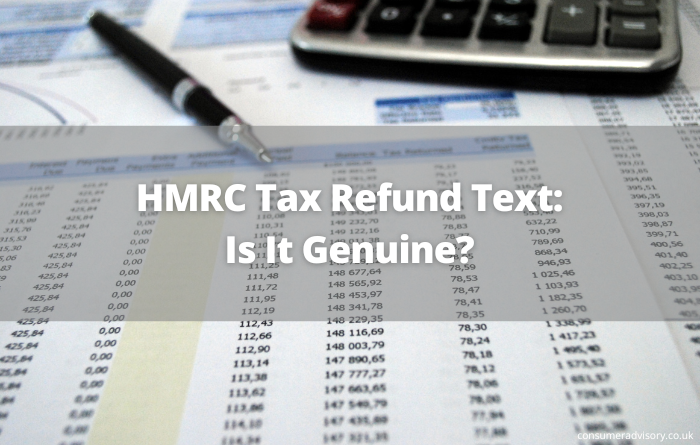
So, you’ve received a HMRC tax refund text and you want to know if it’s genuine. Here’s what you need to know.
HMRC do not send text messages to advise you of a tax refund. If you are due a tax refund from HMRC, you will instead receive a P800 letter in the post to your registered address. So, if you receive a text message informing you that you are due a tax refund from HMRC, this is a scam and you should not respond.
In this article, we’ll tell you everything you need to know about HMRC tax refunds, as well as explaining what you should do if you receive a scam text claiming to be from HMRC.
What Is A Tax Refund?
A tax refund is simply money that HMRC owes you. This can happen for a number of reasons, including:
– You’ve paid too much tax
– You’re entitled to certain tax allowances
– You’ve overpaid on your National Insurance
If you are due a tax refund, you will receive a P800 letter from HMRC. This will detail the amount of money you are owed, as well as how you can claim your refund.
Do HMRC Send Texts For Tax Refunds?
If you’ve received a text message claiming to be from HMRC offering you a tax refund, you may be disappointed to learn that this is a scam. This is a phishing text that will ask you to enter your bank or credit card details, promising a tax rebate. The scammers will then use your details to commit fraud.
HMRC will never contact you by text message or email to inform you of a tax refund. If you are due a tax refund, you will instead receive a P800 letter in the post from HMRC. This letter will be sent to your registered address, so if you receive an email or text message informing you of a tax refund, this is a scam.
What Is A P800 Letter?
A P800 letter is a letter from HMRC that you will receive if you are due a tax refund. This letter will be sent to your registered address and will contain information on how to claim your refund. If you have received a P800 letter, you can be confident that this is a genuine communication from HMRC and you will not be asked to provide your bank or credit card details.
If you have any doubts about the P800 letter you have received, you can contact HMRC directly to confirm that it is genuine.
What Should I Do If I Receive A Scam Text Claiming To Be From HMRC?
If you receive a text message claiming to be from HMRC offering you a tax refund, do not respond. This is a scam and you should not provide your personal or financial details.
If you are concerned that you may have already responded to a scam text, you should contact your bank or credit card provider immediately. You should also contact HMRC to report the scam.
You can find out more about how to report a scam text message on the Action Fraud website.

Do HMRC Send Emails For Tax Refunds?
HMRC do not send emails to advise you of a tax refund. If you are due a tax refund from HMRC, you will instead receive a P800 letter in the post to your registered address. So, if you receive an email informing you that you are due a tax refund from HMRC, this is a scam and you should not respond.
How Do I Know If A Text Or Email From HMRC Is Genuine?
If you have received an email or text message from HMRC and you aren’t sure whether it is genuine, the best thing to do is to contact HMRC directly. To do this, you should call 0300 200 3300. Never call the number that is quoted in the text message or email as this could be the telephone number of a scammer.
HMRC will never ask you for your credit card details. If you are asked to provide your credit card details, it is a scam and you should immediately cease communications and contact your credit card provider.
Does HMRC Ever Contact You By Phone?
HMRC do not contact taxpayers by phone to inform them of a tax refund. This includes calls, text messages and voicemails. If you receive any kind of communication from HMRC by phone, it is a scam and you should not respond.
If you’re unsure, the best thing to do is to contact HMRC directly on 0300 200 3300. They will be able to tell you whether you are owed a tax refund, or whether the communication that you have received was sent by HMRC.
Do HMRC Send Automated Messages?
Yes, HMRC do sometimes send automated messages. For example, if you are self employed, you may receive automated messages to remind you of the self assessment deadline or the date that your tax payments are due. However, these automated messages will never ask you for your bank or credit card details and they will never inform you of a tax refund.
If you receive an automated message from HMRC that asks you for your bank or credit card details, this is a scam and you should not respond. Instead, you should contact your bank or credit card provider immediately to report the fraud.

What Should I Do If I Have Been The Victim Of A Scam?
If you have been the victim of a scam, you should report it to Action Fraud as soon as possible. Action Fraud is the UK’s national fraud reporting centre and they will be able to provide you with advice on what to do next.
You should also contact your bank or credit card provider immediately to report the fraud and to cancel any payments that have been set up. If you have given away your personal or financial details, you should also contact HMRC as soon as possible so that they can take steps to protect you from identity theft.
How Do I Speak To A Human At HMRC?
If you need to speak to a human at HMRC, the best thing to do is to call 0300 200 3300. This is the general enquiries number for HMRC and they will be able to put you through to the right department.
Final Thoughts
The HMRC tax refund text is a common scam that is currently doing the rounds. If you receive a text message from HMRC informing you of a tax refund, do not respond and instead report it to Action Fraud as soon as possible.
If you are ever unsure about the authenticity of a communication from HMRC, the best thing to do is to contact them directly on 0300 200 3300. A member of staff will be able to advise you whether the communication is genuine or not.
